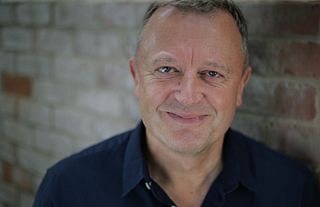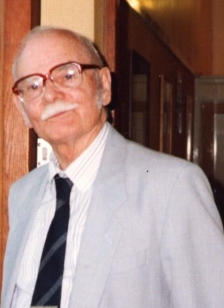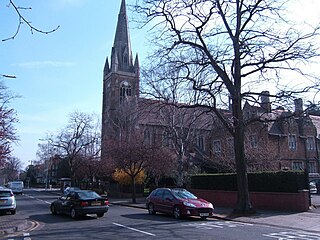The work
The Fantasia opens with a colossal fortissimo prelude for organ in the phrygian mode leading to a chord – causing one reviewer in The Observer to comment, in a spirit of an all too prevalent parochialism, that "when Holst begins his new Choral Fantasia on a six four of G and a C♯ below that, with an air of take it or leave it, one is inclined to leave it" – which introduces the soprano ("Man born of desire, cometh out of the night") over almost inaudible organ line. A chromatic fugato section bearing the otherworldly bleakness of Egdon Heath and Saturn follows before trumpets, trombones and timpani rise menacingly in 5
4 introducing an important, typically Holstian, ostinato figure. The chorus enters, hymnlike, in 7
4 with the words "Rejoice, ye dead where ere your spirits dwell" to diatonic brass accompaniment. This leads to a climax with a reprise of the opening organ prelude. The ensuing music, really a reprise of the fugato section, travels through some unexpected harmonic procedures and dissonances but a brief poignant section for strings leads to the return of the soprano ("Rejoice, ye dead") over the fading string accompaniment ending the work on a note of resignation.

Robert Eugene Ward was an American composer who is best remembered for his opera The Crucible (1961) after the 1953 play of the same name by Arthur Miller. He was awarded the Pulitzer Prize for Music for that opera in 1962.

Alun Hoddinott CBE was a Welsh composer of classical music, one of the first to receive international recognition.

Patrick Hawes is a British composer, conductor, organist and pianist.
Alan Ridout was a British composer and teacher.
William James Mathias CBE was a Welsh composer noted for choral works.
Václav Nelhýbel was a Czech-American composer, mainly of works for student performers.
Walter Sinclair Hartley was an American composer of contemporary classical music.

Ian Parrott was a prolific Anglo-Welsh composer and writer on music. His distinctions included the first prize of the Royal Philharmonic Society for his symphonic poem Luxor, and commissions by the BBC and Yale University, and for many leading British musicians. In 1958 his cor anglais concerto was first performed at Cheltenham Festival, and in 1963 his cello concerto was given by William Pleeth and the Hallé Orchestra – both concertos were conducted by Sir John Barbirolli.

Miloslav Kabeláč was a distinguished Czech composer and conductor. Kabeláč belongs to the foremost Czech symphonists, whose work is sometimes compared with Antonín Dvořák's and Bohuslav Martinů's. In the communist period, his work was on the periphery of official attention and was performed sporadically and in a limited choice of compositions.
Patrick Larley is a British composer.

Rejoice in the Lamb is a cantata for four soloists, SATB choir and organ composed by Benjamin Britten in 1943 and uses text from the poem Jubilate Agno by Christopher Smart (1722–1771). The poem, written while Smart was in an asylum, depicts idiosyncratic praise and worship of God by different things including animals, letters of the alphabet and musical instruments. Britten was introduced to the poem by W. H. Auden whilst visiting the United States, selecting 48 lines of the poem to set to music with the assistance of Edward Sackville-West. The cantata was commissioned by the Reverend Walter Hussey for the celebration of the 50th anniversary of the consecration of St Matthew's Church, Northampton. Critics praised the work for its uniqueness and creative handling of the text. Rejoice in the Lamb has been arranged for chorus, solos and orchestral accompaniment, and for SSAA choir and organ.
David Wynne was a prolific Welsh composer, who taught for many years at Cardiff University and wrote much of his best-known music in retirement.
The Choral Symphony is a work by Gustav Holst for soprano soloist, chorus, and orchestra in a setting of verses by John Keats. Written in 1923–24, it was premiered in Leeds Town Hall on October 7, 1925, conducted by Albert Coates with Dorothy Silk as soloist. The same performers gave the work's second performance three weeks later in Queen's Hall, London. The work is sometimes known as the First Choral Symphony, although a planned 'second Choral Symphony' never progressed beyond some uncompleted sketches.
Gary Alan Kulesha is a Canadian composer, pianist, conductor, and educator. Since 1995, he has been Composer Advisor to the Toronto Symphony Orchestra. He has been Composer-in-Residence with the Kitchener-Waterloo Symphony (1988–1992) and the Canadian Opera Company (1993–1995). He was awarded the National Arts Centre Orchestra Composer Award in 2002.
Andrew Perkins is a New Zealand composer, choral conductor and teacher. He has had a number of works recorded and performed internationally.

Andreas Makris was a Greek-American composer and violinist, born in Kilkis, Greece, on March 7, 1930. He was a Composer-in-Residence for many years at the National Symphony Orchestra in Washington DC, working with conductors such as Howard Mitchell, Mstislav Rostropovich, Antal Dorati, and Leonard Slatkin. He composed around 100 works for orchestra, chamber ensembles, and solo instruments, including the Aegean Festival Overture, which, transcribed for concert band by Major Albert Bader of the USAF Band, became a popular piece with US bands. Grants and awards he received include the Damroch Grant, National Endowment for the Arts Grant, the Martha Baird Rockefeller Award, ASCAP Award, the Fulbright Scholarship, and citations from the Greek Government.

Aleksander Robert Szeligowski was a Polish composer, conductor, organist and pedagogue. He studied in Poznań and Warsaw, later working as assistant conductor for the Poznań Philharmonic. Son of Tadeusz Szeligowski, he is the author of numerous compositions for piano, female and mixed choirs and others.

Romuald Twardowski was a Polish composer, pianist, organist and academic teacher who studied in Vilnius, Warsaw and Paris. In a style described as "developed neoclassicism", he composed operas, ballets, instrumental music and vocal works, especially sacred music for both Catholic use and the Orthodox Church. He achieved international prizes for his compositions, and many works were recorded in anthologies, including the Violin Concerto, chamber music, and sacred and secular choral music such as the Liturgy of St. John Chrysostom. He was professor at the State Academy of Music in Warsaw from 1972 to 2008.

The Hymn of Jesus, H. 140, Op. 37, is a sacred work by Gustav Holst scored for two choruses, semi-chorus, and full orchestra. It was written in 1917–1919 and first performed in 1920. One of his most popular and highly acclaimed compositions, it is divided into two sections. The Prelude presents the plainsong Pange lingua and Vexilla regis first instrumentally and then chorally; the second section, the Hymn, is a setting of his own translation of the Hymn of Jesus from the apocryphal Acts of John.









